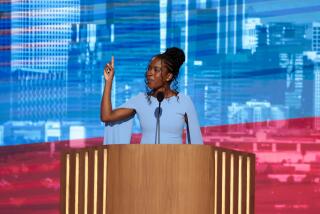Poet Angelou Extols Value of Faith, Charity : Religion: Speech before about 10,000 at Anaheim Convention Center draws on stories from scholar’s childhood in the South.
- Share via
ANAHEIM — Faith and charity were extolled by poet, author, dancer, actress, scholar and teacher Maya Angelou as she talked Saturday before about 10,000 people at the Religious Education Congress here, often drawing from her experiences growing up in the South.
Acknowledging the thundering ovation by the standing-room-only crowd in the cavernous Anaheim Convention Center arena, Angelou bowed several times with her dancer’s grace and said, “Good morning,” echoing the last line in the now-famous poem “On the Pulse of Morning” she recited last month at President Clinton’s inauguration.
Angelou enthralled the hushed audience with poetry, she invoked laughter with stories from her Stamps, Ark., childhood and from her adventures as a dancer touring Europe, and she mixed Gospel songs in with her speech.
“I hope you’ve brought everything you need,” she said, “because I’m going to be here a few hours.”
Then she went on to recall both the joys and the tragedies of her childhood in a segregated South.
Many of the stories were recorded in her 1969 autobiography, “I Know Why the Caged Bird Sings.”
For about 40 minutes, she talked about the influence and the religious strength her grandmother, Annie Henderson, instilled in her.
When she was 3 and her brother, Bailey, was 4, their parents ended their turbulent marriage. Her father shipped his children to live with Grandmother Henderson.
“Momma,” as Angelou subsequently called her grandmother, was instrumental during her formative years. It was Momma who exemplified “love, faith and charity.”
She recalled Momma’s hard work selling meat pies to the men at the lumberyard and the cotton gin, somehow managing to seem that she was both places at once. Eventually, Momma saved enough to open the only black-owned store in town.
Her grandmother’s heavy ties with the church established an early religious foundation in Angelou.
“The only day we didn’t go to church was Saturday,” Angelou said. “We used Saturday to prepare for church the next week.”
Angelou also talked about the rape she suffered at age 7 1/2 by her mother’s boyfriend in St. Louis. Angelou reported it and the man was arrested. He was later released, but was kicked to death and left behind on the lot behind a slaughterhouse.
“My childhood mind deduced that it was my words that had killed him,” Angelou said.
She stopped talking for almost six years.
She credited her religious faith in bringing her back.
“Faith is evidence of things not seen,” she said. “It was God alone.”
She called upon the crowd to practice charity, to be forgiving.
“Philanthropy is fun and good,” she said. “But there is a distance between the giver and the recipient. . . . The difference between charity and philanthropy is the distance of soul. . . . To be philanthropic is to give something, to be charitable is to give one’s own heart.”
Echoing one message in her inaugural poem, Angelou asked audience members to dedicate themselves to the “liberation of the human spirit,” and not waste years of “useless virtue” on temerity and ignorance.
More to Read
Sign up for Essential California
The most important California stories and recommendations in your inbox every morning.
You may occasionally receive promotional content from the Los Angeles Times.













